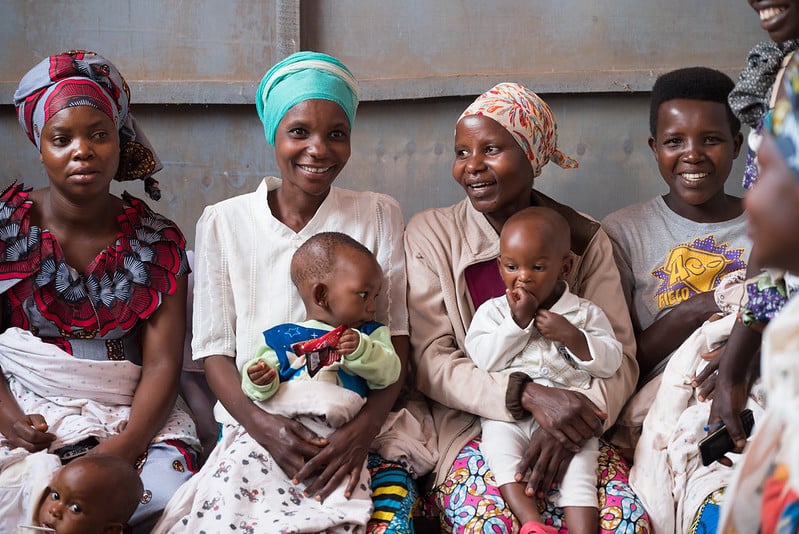CQUIN’s Maternal and Child Health (MCH) stream of work is focused on integrating MCH services into HIV services.

CQUIN promotes the design, implementation, and scale-up of differentiated service delivery (DSD) models that respond to the maternal health needs and preferences of women who move between many DSD points along the course of pregnancy, including postnatal and early child follow-up with evolving needs throughout their reproductive life course.
Community of Practice
Launched in 2021, the maternal and child health CoP focuses on ensuring the integration of services to optimize care for pregnant and breastfeeding mothers enrolled in DSD programs.
The CQUIN MCH CoP has hosted meetings and webinars to discuss integrating maternal child health interventions into current DSD platforms for HIV service delivery. Participating countries have shared country-based models that integrate essential components of care for women living with HIV, such as family planning and postnatal follow-up, into DSD models with particular focus and attention on essential components of care for women living with HIV, including nonpregnant women enrolled in DART models, women newly starting ART during pregnancy, women already on ART who become pregnant, and postnatal HIV-infected women and their infants.
Dr. Rachel Mudekereza (CQUIN Senior Regional Advisor for West and Central Africa) and Dr. Rudo Kuwengwa (CQUIN Regional Clinical Advisor) are the CQUIN MCH technical leads supported by and Ms. Léocadie Koffi (Project Operations Coordinator).
Activities
The MCH CoP theory of change prioritizes working with partners and recipients of care as peers and co-practitioners to accelerate the delivery of quality services at scale by exchanging best practices related to DSD for women living with HIV. To that end, CQUIN has identified opportunities to co-create resources and strengthen networks of practitioners and policymakers to promote ongoing cross-country learning.
Activities so far include:
- Organizing a series of MCH brainstorming workshops in October 2020 to enable CQUIN country teams to develop plans to define optimal MCH models.
- Hosting a 4-day virtual meeting in May 2021 focused on Leveraging the Lessons of Differentiated Service Delivery to Provide High-Quality Integrated Maternal and Child Health Services.
- Convening an IAS satellite in July 2021 summarizing key issues related to differentiated MCH and HIV care, including a debate on optimal models for mother/baby pairs.
- Launching quarterly calls in September 2021 to review country priorities and activities related to DSD for MCH.
- Facilitating a virtual country-to-country exchange of best practices, resources, and tools in May 2022, connecting health care providers with donors and technical assistance partners.
- Rolling out a literature review on FP/HIV integration and integrating FP into less intensive DSD models followed by a rapid assessment survey of FP/HIV integration in CQUIN member countries, including key informant interviews in three selected countries.
- Facilitating three country-to-country learning exchange visits on FP/HIV integration.
HIV/FP integration-focused learning visits
In 2023, CQUIN supported a portfolio of activities, including enhanced country-to-country (C2C) learning exchanges to build the knowledge base about FP/HIV integration into less-intensive DSD treatment models. Rwanda and Mozambique with support from CQUIN, hosted the learning visits. Discussions centered on the status of FP/HIV integration in the context of differentiated treatment models within visiting and the host countries, the exchange of best practices, identification of barriers and challenges, and discussions on how the CQUIN network can facilitate the scale-up of FP/HIV services that meet the needs and expectations of women living with HIV.
CQUIN’s 2020 Workshops
At the end of October 2020, CQUIN hosted multi-country discussions on differentiated MCH services ahead of the launch of its differentiated MCH community of practice. When CQUIN network members expressed interest in discussing the role of maternal and child health services in contributing to the last mile, CQUIN led a series of formative workshops that helped determine and set the premise for countries in the network to prioritize differentiated MCH services.
The workshop covered the following:
- Overview of the gaps in MTCT (getting to the last mile), discussions on opportunities for integrated service delivery and promising practices and COVID-19 implications (ICAP/WHO/UNICEF or UNAIDS)
- Updates from each CQUIN country team
- Guided discussions by a CQUIN/MCH Facilitator; participation from recipients of care
- Summary /Call to action in preparation for the larger Differentiated MCH meeting in 2021.
Resources
- MCH CoP Call | May 2023 — Slides | English Recording | French Recording
- MCH CoP Call | August 2023 — Slides | English Recording | French Recording

